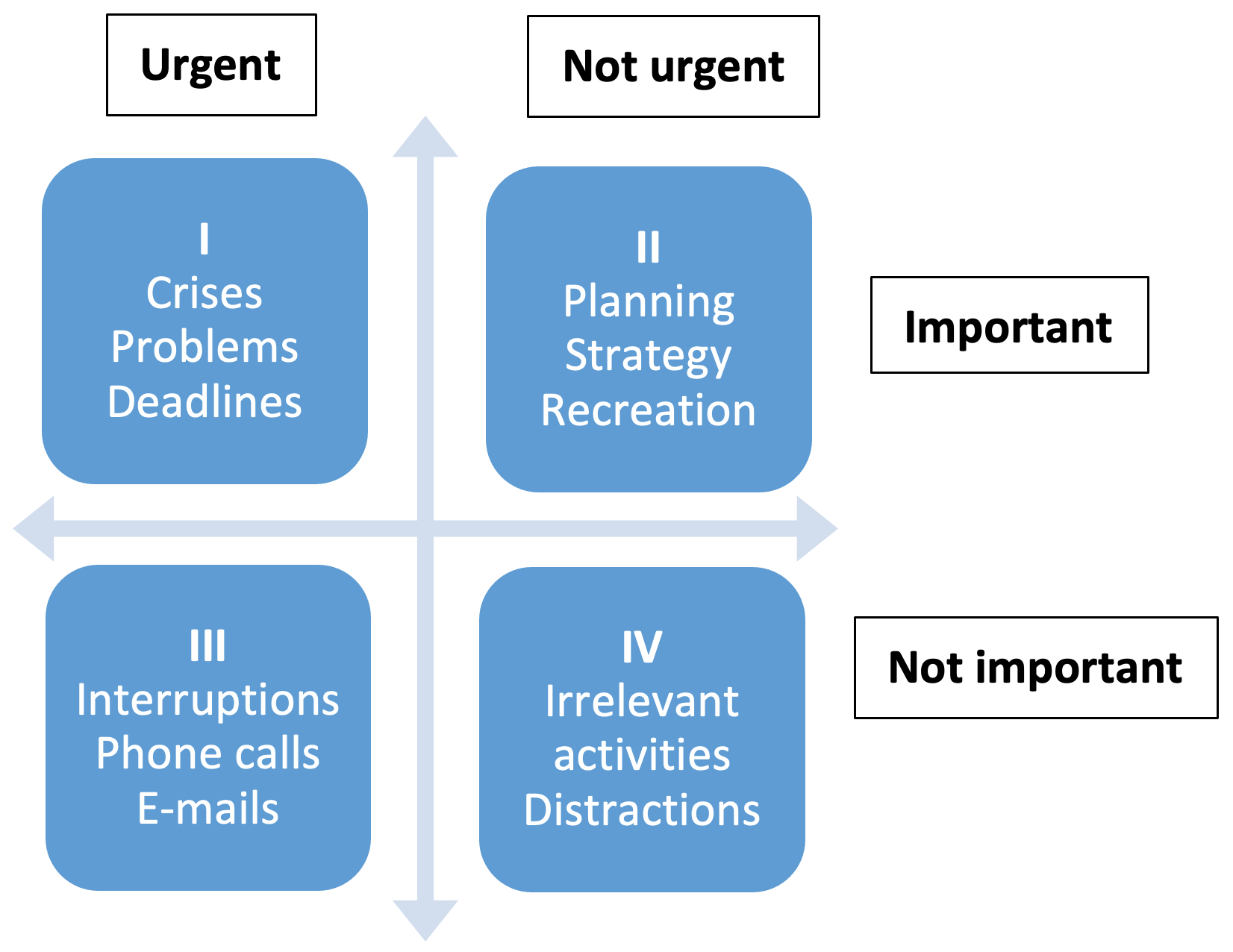Managing your time efficiently is a major challenge of (digital) studying. As a student, you are required to independently schedule time for studying, learning and working. The Center for Teaching and Learning (CTL) has compiled important principles and three specific time management methods that aim to support you.
Principles of time management
- For successful time management, it is essential that you have an overview of the tasks you have to complete: Try to get an overview before you get to work.
- Only keep things on your workspace that you really need. This also applies to your computer: Only open applications that you actually need. Click this link for tips about setting up your workplace.
- Define what you will do and prioritise the tasks. Learn to distinguish between important matters and urgent matters (-> time management matrix, see below). Do not allow urgent matters to determine your work schedule.
- Distribute your workload in a way that you can realistically cope with it. This may be difficult in the beginning, but your plans will soon become firmer.
- Define results and objectives, not only activities or tasks.
- Find out when you perform best and use this time as time for studies.
- Schedule longer periods for challenging larger tasks that you can work on without interruption, and shorter periods for routine tasks (-> ABC analysis, see below).
- Ensure that there is variety in your schedule.
- Make sure to take breaks. Taking breaks is very important for studying and working. Schedule the beginning and end of the break in advance.
And finally: Be flexible! The purpose of a work schedule is not to strictly stick to it but to achieve your objectives. To ensure that work schedules do not become an end in themselves, it is important that you regularly evaluate the progress in achieving your objectives. Do you have to change your schedule, or have you already achieved your objective?
Methods of time management
Prioritising cleverly: ABC analysis
This simple method helps you to prioritise and to distinguish between very important (A), important (B) and less important (C) tasks. Depending on your prioritisation, you assign a suitable amount of time to individual tasks.
- Very important tasks (A): These tasks have utmost priority for achieving your objective. As they are rated “more valuable”, you should schedule between 60 and 70 % of your working time for performing these tasks. Reserve the periods during which you perform best for these tasks.
- Important tasks (B): These tasks support you in achieving your objectives since they are important but not absolutely necessary. Therefore, you should schedule between 20 and 25 % of your working time for completing them.
- Less important tasks (C): These tasks also support you in achieving your objective, but they have little importance. Schedule between 5 and 15 % of your working time for completing them. These tasks mainly include routine activities necessary to prepare for tasks that fall into category A. You can easily complete these tasks during phases when your performance is low or when you have little time.
Urgent or important: Time management matrix
This method is similar to the ABC analysis. It divides activities in four categories and, therefore, helps you to prioritise them.
- Quadrant I includes tasks that are urgent and important. You should complete these tasks as soon as possible. If the majority of your tasks fall into this category, this causes a great deal of stress in the long run.
- Quadrant II has a focus on long-term planning, pursuing projects and preventing professional and private problems. Neglecting tasks in this area will cause problems in quadrant I. On the other hand, tasks in this category are often neglected in favour of tasks in quadrant III.
- The tasks assigned to quadrant III are urgent. Therefore, they seem to be important. Try to complete these tasks efficiently and also try to say “No” early enough. Try to reduce tasks that fall into this category.
- Quadrant IV includes tasks that are neither urgent nor important. Try to eliminate or, at least, reduce tasks that fall into this category.
Planning cleverly: 5 steps for planning your daily activities
This method supports you in planning your daily activities. The prerequisite is that you already have a clear overview of the pending tasks. Take the five steps:
- List tasks and activities. To list all tasks and activities, it is important that you already have an overview of them.
- Estimate how long it will take to complete the task or activity. Do not feel discouraged if your first time estimates differ from the actual time it took you to complete the tasks. You will gradually learn to assess the time needed to complete pending tasks and activities correctly.
- Add buffer time. Many things are hard to plan, others emerge during the flow of work and some events might occur unexpectedly. Therefore, it makes sense to schedule buffer time to accommodate all these possibilities. It is recommended to add a buffer time of 40 % of your working time.
- Make decisions. In this step, you decide how you want to prioritise the tasks and activities listed in the first step and whether you need to shorten the time periods scheduled for some of the tasks. You might have to change your schedule slightly.
- Final check. Evaluate whether you were able to stick to the schedule and move any unfinished tasks to the next day.
We recommend that you start planning the following day on the evening before and/or after work has been done. This allows you to create a link to the tasks you have already completed, and to tune in to the tasks ahead.
If you often grapple with procrastination during your studies or if planning mistakes happen to you regularly, the following blog contributions might be helpful:
- Procrastination: Why we are postponing tasks
- Time management: How can I avoid planning mistakes and procrastination?
Want to read more? 😊 Check out our blog posts with the following topics:




